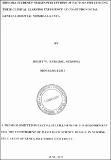| dc.description.abstract | Globally clinical expertise is the knowledge and skills of the health care professional. The clinical expertise of the nurse depends on educational preparation, current knowledge and research. Nurse training has a theory and practice component. Studies have shown that not all practice institutions are able to provide nursing students with all the essential resources for clinical learning. Globally especially in studies carried out in developed countries, lack of institutional related resources, mentorship and student related factors have been found to negatively influence the effectiveness of student learning in clinical placement. In Kenya and the study area (CPGH) there is little documented information on these factors. The main objective of this study was therefore to determine the factors that influence clinical learning of diploma student nurses at CPGH in order to improve clinical learning outcomes. A cross-sectional survey was done. A sample size included 141 diploma nursing students in first, second and third year of study from Mombasa KMTC. A pretested self-administered questionnaire was used to collect the data. Quantitative data was obtained by filling in the questionnaires. Person's correlation coefficient and chi-square test analysis was used to determine the relationship between variables. The level of significance was fixed at p= 0.05. The study revealed there was overcrowding of patients and students (90.8%). Ward management style supported clinical learning at an average. Inadequate supplies and equipment for student's clinical learning were reported by 99.2%. There was informal mentorship as majority of students were not allocated mentors and college lectures were not always accompanying student to clinical placements leading to inadequate support. On student factors, they were not always punctual (67.5%) and (66.75%) did not participate adequately in teaching ward rounds. There was a significant association between institutional factors (p=0.047), mentorship factors (p=0.001) and student related factors (P=008) in CPGH clinical placement. They collectively negatively influenced learning outcome at an extent of 49.8%. This is because out of 141 diploma students the majority rated themselves below 70% in clinical learning outcome a mark used to judge clinical competence. The study recommends to stakeholders to initiate reforms at CPGH to improve clinical learning. | en_US |

